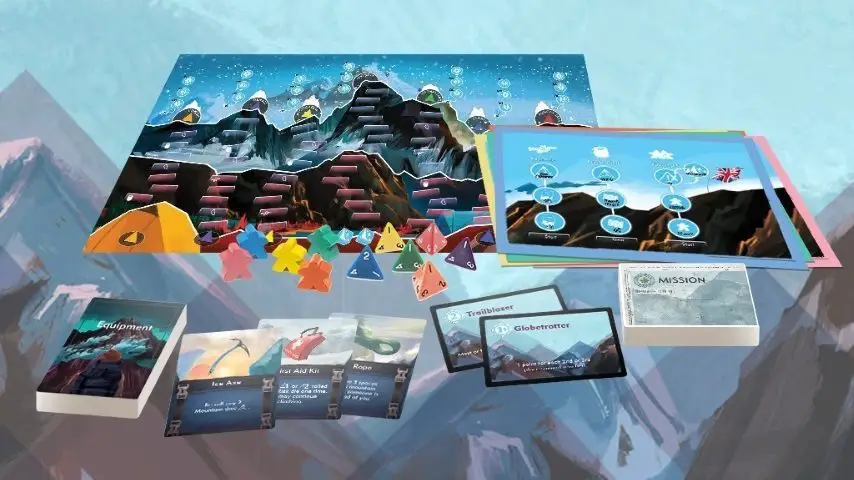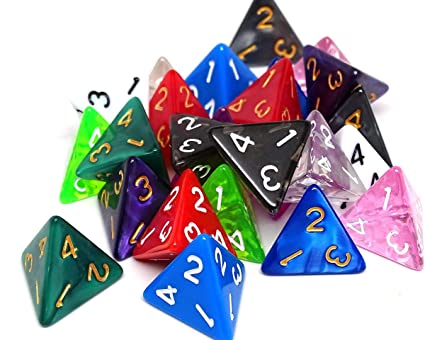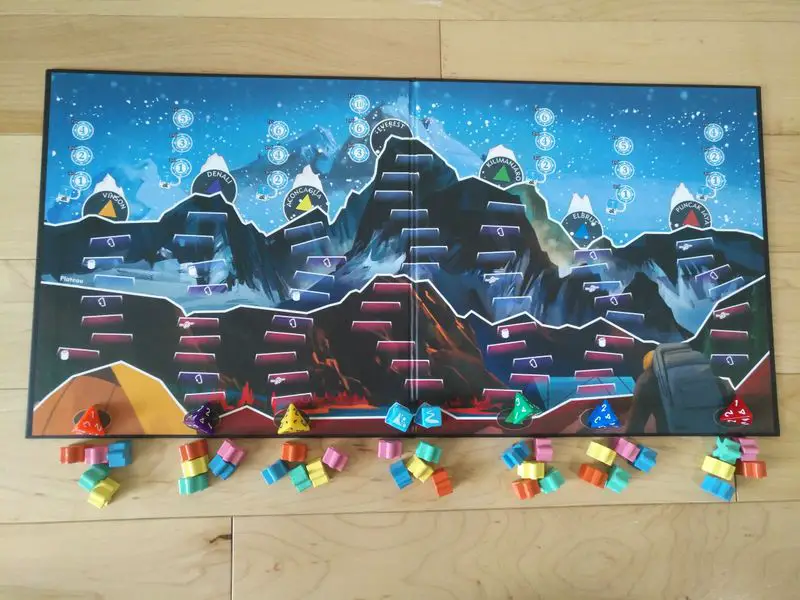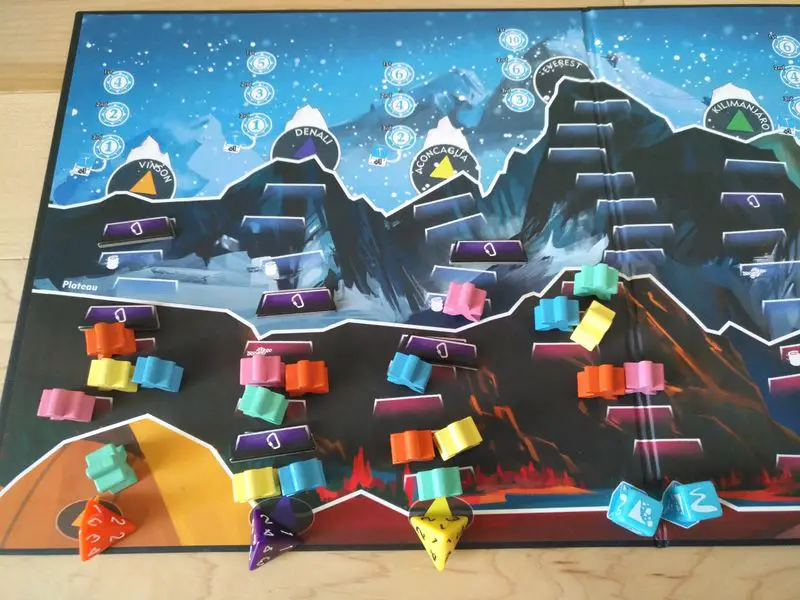Welcome back friends, to another tabletop game review! We’re going back to a board game this time. Specifically, 7 Summits from Deep Water Games, a game from earlier this year all about competitive mountain climbing!

The premise is fairly simple. You play as a team of world class mountain climbers, and your goal is to climb the tallest mountains on each of the seven continents.
Interestingly enough, there’s elements of JRPG to 7 Summits. As you go on, you can upgrade your equipment and skills, making future climbs easier. In addition, the game relies just as much on luck as it does strategy (literally, the back of the box even ranks them as equally important when breaking down the gameplay elements), in the form of dice rolling. To further hammer home the RPG elements, the game heavily features four sided dice, something you rarely see in board games.

So, obviously the first thing to discuss about a game is, well, if it’s any good or not. Fortunately, yes, 7 Summits is quite good. Well, provided you’re looking for a mountaineering game with light RPG elements that is.
The Make-Up of 7 Summits
However, it is not entirely without problems. Namely…the board.

What’s the problem with it? Simply put, it doesn’t feel like it’s designed for a full game. The game says it’s for two to five players, but the board is barely a foot long and, as you can see, isn’t really designed to be used looking from the top down. This board was simply not designed well for five people to use it comfortably. Honestly, I’d say having three people might be pushing it.
Aside from that one problem though, 7 Summits is a rather well made game. The board is clear and easy to read (if you’re looking at it right), the cards are likewise well designed and formatted, the dice and tokens are all of high quality, everything else is here. The board could just use some upscaling. I mean, this is a game about climbing the highest mountains on every continent after all, why not have a board that gives us a little more sense of scale?
Playing 7 Summits
To move on, how exactly do you play this? Fortunately, that’s relatively simple to explain. Much like Tiny Tina’s Robot Tea Party from last week, 7 Summits is a game that’s fairly easy to explain, made more complicated by luck than anything else, though there is a bit more to keep track of here.
Every player is going to be climbing every mountain (or at least, have the option to climb every mountain) over the course of the game, and which you climb each round is entirely up to you. You can climb up Denali one turn and Everest the next, without any problems.

Each player picks a different team, identified by the color of their climber tokens (seven for each color), and places a climber on each summit’s ladder. As you can see the board is split in half, between the Plateau (the red on the bottom) and the mountains above. This mainly impacts your equipment and mission cards, which we’ll discuss in a moment.
Six of the summits of 7 Summits has its own color, which correspond to the six four sided dice. At the start of each round, the first player rolls all six dice and places them on the board. This represents how far up the mountain you can go this round…to an extent. Everest has two six sided blue dice you see, called Risk Dies. These are the only dice for Everest, as it’s the most challenging of the mountains, but these can be used for any other mountain. After you’ve moved up the number of spaces on the four sided die that’s connected to the mountain, you can choose to ‘Press On’, rolling the four sided die again, as well as a Risk Die.
Three sides of the Risk Die are safe. You roll them, and you can move up however high you rolled on the four sided one, and are even free to gamble on rolling again. However, another two sides subtract one or two spaces from the four sided die, and carry the risk of forcing you to move backward, as well as ending your turn. Worst of all is the final side, which represent an avalanche. You roll that one, you have to go all the way back down the mountain, and again, your turn is ended.
The exception to all of this is Everest. The most dangerous of the peaks in 7 Summits, Everest plays by its own rules. The good news is that you can use any of the four sided die to move your climber up it. The bad news is that if you decide to Press On, you have to roll both Risk Dice, and follow the worst result.
Of final note with regards to the dice, is that each of the four sided ones can only be used once per round. So while the game doesn’t have the more direct ways to mess with your opponents that other board games do, you can stop them from advancing by choosing a mountain before them, either so you can try to get past them or so you can go up Everest.
Now, the cards are rather more simple. There are equipment cards, which can be used before or after your climb and will benefit you immediately, and mission cards. Mission cards play into the roleplaying elements of the game, actually, as they represent the goal of your climber. If you achieve the goal on the card by the end of the game, you get extra points added to your total.
Finally, let’s talk about the other RPG element here in 7 Summits, the skills. Every player has a card with a small skill tree on it, and scattered across the board are various icons. If you finish your climb on a space with one of these icons, then you can increase your skill marker on the card. The skills are Preparation, Expertise, and Teamwork, each enhancing your ability to move along in their own ways.
The game ends when at least one player has a climber at the top of every mountain, though you finish the final round so that everyone gets an equal number of turns. Everyone adds up their point totals, which are gained by completing mission cards and being one of the first three to a summit (each summit assigns points to the first three people to reach it, going down in descending order). Whoever has the most points wins.
Final thoughts.
So, as I stated up top, 7 Summits is an honestly pretty good game. It has some flaws, most notably in its board design, but overall it’s a good game for those who want something more in depth, and particularly those wanting a board game with some RPG elements. I don’t know if I’d consider it a particularly great gateway game, it’s a bit much for casual players I feel. But at the same time I did enjoy my time with it, and it’s a worthy addition to anybody’s collection.
Images Courtesy Of Deep Water Games
Have strong thoughts about this piece you need to share? Or maybe there’s something else on your mind you’re wanting to talk about with fellow Fandomentals? Head on over to our Community server to join in the conversation!

